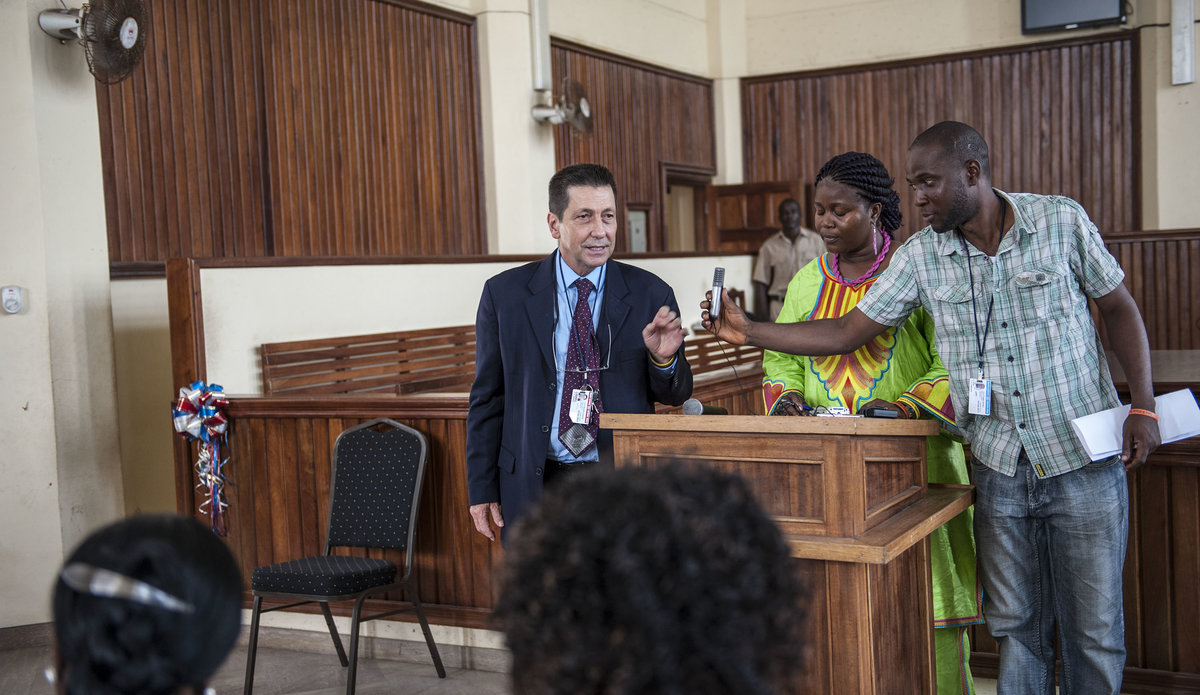Identity Protection for Rape Survivors
“A few years ago, as a member of legal team representing a ten year old girl who was allegedly raped in Monrovia, I was stunned and shaken when my client was put forward to testify in an open court, before the glare of a group of men who had stormed the court in support of the alleged rapist,” Associate Supreme Court Justice Jamesetta Howard-Wolokollie recounted. The little girl was asked all sorts of humiliating questions in the full glare of the public and the alleged perpetrator.”
Thanks to the UN Joint Programme on Gender Based Violence, such a scenario is unlikely to be repeated at courts hearing rape cases in Liberia.
With support from the Swedish Development Agency (SIDA), mobile in-camera screens are now helping protect the identity of survivors of rapes or other forms of gender based violence testifying in court.
And Justice Wolokollie, speaking during the presentation of the screens at the Temple of Justice, described the initiative as a big step forward in ensuring justice for survivors of rape. “This effort gives our young girls who have been raped a stronger reason to come to court and testify and for us to prosecute the alleged perpetrators.”
Liberia’s Justice Minister Christiana Tah also shares the view that the mobile partition protecting the identity of a survivor of rape gives hope to efforts aimed at prosecuting rape cases.
“When a child is raped, that child becomes traumatized and bringing her to testify in an open court adds to the trauma. But with these mobile partitions, the victims of rape will have the courage to come to court and testify as their identities will be concealed.”
Tah called for collective efforts to combat rape in the society. “Majority of the victims are children under12. This is sickening. This malady should not continue with impunity in our society,” Tah stressed.
The Justice Minister said there should be no compromise of rape cases in the country. “It is disheartening when a law enforcement officer supervises the settlement of a rape case between a parent and the perpetrator.” She said anyone who attempts to or compromises a rape case must face the law.
Tah announced that the government, in its bid to curb rape in the society, is undertaking DNA testing in the prosecution of perpetrators of rape. “This is also a step forward to stop rape in our society. We must explore all fronts in the prosecution of rape cases. Our children should grow up without being abused by heartless people.”
The then Deputy Special Representative of the Secretary-General for Rule of Law, Louis Aucoin, described the initiative as a very important contribution to protect children during criminal justice process.
“The children need a very special treatment and I think the use of the screens is only really a first step and I think we also have to be giving a lot of thoughts as to how the children should be dealt with in terms of questioning and testimony and participating as witnesses,” Aucoin noted. “The screens present a huge first step in prosecuting rape cases.”
The Head of the SGBV Crimes Unit at the Ministry of Justice, Felecia Coleman, said the move is a boost to the Unit’s efforts to ensure justice for victims of rape and other forms of gender based violence. Coleman disclosed that since the establishment of the Unit in 2009, it has prosecuted over 28 rape cases with 61 percent conviction.
 UN
UN United Nations Peacekeeping
United Nations Peacekeeping





